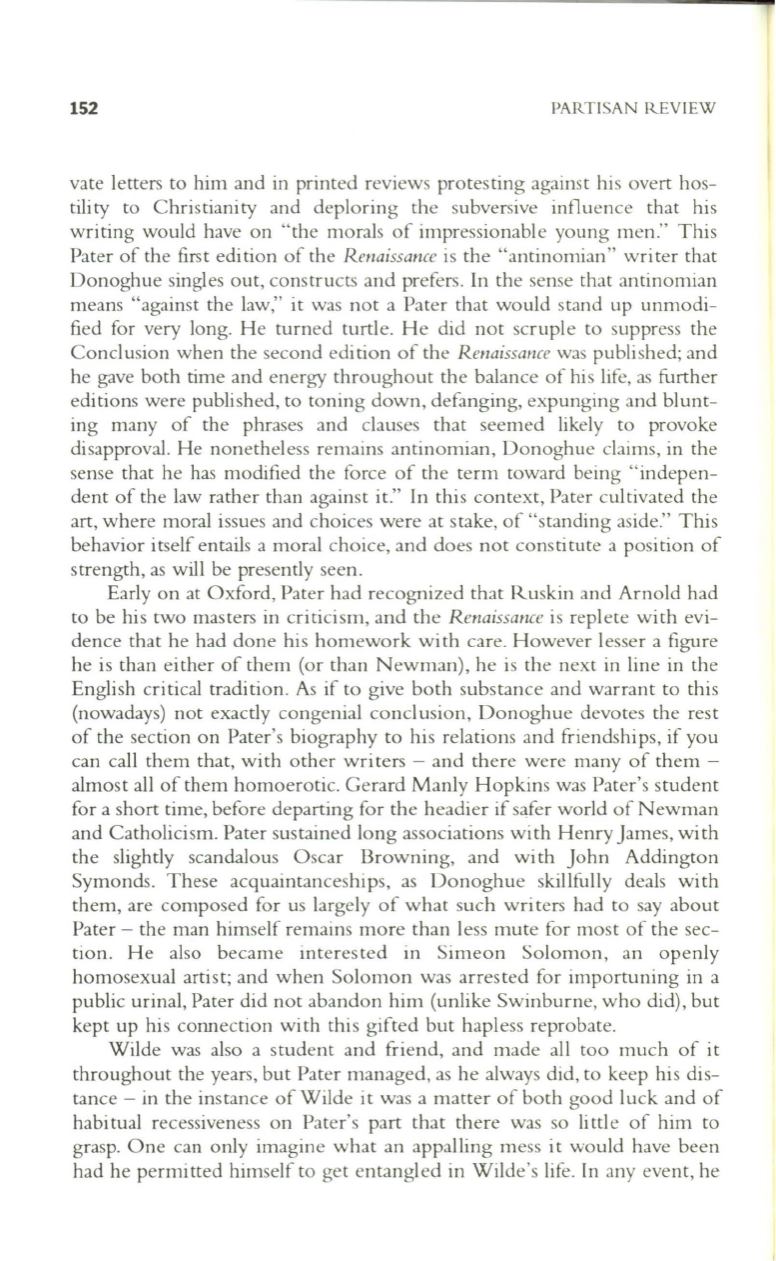
152
PARTISAN REVIEW
vate letters to him and in printed reviews protesting against his overt hos–
tility to Christianity and deploring the subversive influence that his
writing would have on "the morals of impressionable young men." This
Pater of the first edi tion of the
Renaissance
is the "antinomian" wri ter that
Donoghue singles out, constructs and prefers. In the sense that antinomian
means "against the law," it was not a Pater that would stand up unmodi–
fied for very long. He turned turtle. He did not scruple to suppress the
Conclusion when the second edition of the
Rerzaissance
was published; and
he gave both time and energy throughout the balance of his life, as further
editions were published, to toning down, defanging, expunging and blunt–
ing many of the phrases and clauses that seemed likely to provoke
disapproval. He nonetheless remains antinomian, Donoghue claims, in the
sense that he has modified the force of the term toward being "indepen–
dent of the law rather than against it." In this context, Pater cultivated the
art, where moral issues and choices were at stake, of "standing aside." This
behavior itself entails a moral choice, and does not constitute a position of
strength, as will be presently seen.
Early on at Oxford, Pater had recognized that Ruskin and Arnold had
to be his two masters in criticism, and the
Rerzaissance
is replete with evi–
dence that he had done his homework with care. However lesser a figure
he is than either of them (or than Newman), he is the next in line in the
English critical tradition. As if to give both substance and warrant to this
(nowadays) not exactly congenial conclusion, Donoghue devotes the rest
of the section on Pater's biography to his relations and friendships, if you
can call them that, wi th other wri ters - and there were many of them -
almost all of them homoerotic. Gerard Manly Hopkins was Pater's student
for a short time, before departing for the headier if
s~fer
world of Newman
and Catholicism. Pater sustained long associations with Henry James, with
the slightly scandalous Oscar Browning, and wi th John Addington
Symonds. These acquaintanceships, as Donoghue skillfully deals with
them, are composed for us largely of what such writers had to say about
Pater - the man himself remains more than less mute for most of the sec–
tion. He also became interested in Simeon Solomon, an openly
homosexual artist; and when Solomon was arrested for importuning in a
public urinal, Pater did not abandon him (unlike Swinburne, who did), but
kept up his connection with this gifted but hapless reprobate.
Wilde was also a student and friend, and made all too much of it
throughout the years, but Pater managed, as he always did, to keep his dis–
tance - in the instance of Wilde it was a matter of both good luck and of
habitual recessiveness on Pater's part that there was so little of him to
grasp. One can only imagine what an appalling mess it would have been
had he permitted himself to get entangled in Wilde's life. In any event, he


